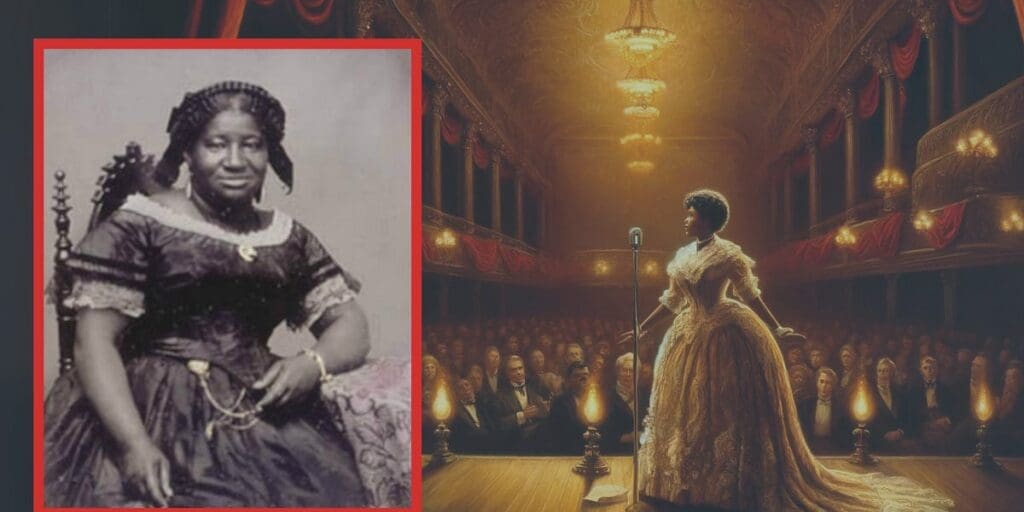Black History & Cultural Perspectives:
Elizabeth Taylor Greenfield was born into slavery in 1819 in Natchez, Mississippi, with little reason to believe she would one day become one of the most celebrated vocalists of her time. Yet, through resilience, talent, and sheer determination, Greenfield would shatter racial barriers in the 19th-century music industry, earning the nickname “The Black Swan” for her extraordinary vocal range and mastery of classical music.
At a time when America was still deeply entrenched in racism and segregation, Greenfield’s voice commanded respect in concert halls across the United States and Europe—even in the presence of British royalty. Her journey from bondage to international fame was one of courage, perseverance, and musical genius.
Greenfield’s early life was marked by hardship. As an infant, she was taken to Philadelphia by a Quaker woman who had freed her slaves. There, she served as a maid and companion, but her musical gifts soon became undeniable. Though she lacked formal vocal training, her powerful voice and remarkable range stunned audiences wherever she sang.
After her former mistress died, Greenfield was left to fend for herself. But she was determined to make a living using her gift. She began singing at private events and public performances, quickly earning a reputation as an exceptional vocalist.
By 1851, Greenfield’s talent had captivated audiences in the Northeast, leading to performances in Buffalo and Rochester, New York. She soon caught the attention of promoters, including the controversial Colonel J. H. Wood, who managed her career but also barred Black audiences from attending her concerts.
Despite this injustice, Greenfield’s popularity soared, culminating in a historic performance at Metropolitan Hall in New York City—but not without backlash.
So, you know if you Purchase anyone of our Bestselling books, you’ll get a FREE eBook copy of any book of your choice. All you have to do is email us (mcgheesmediaempire@gmail.com) a copy of the Amazon receipt. Don’t miss out on this special offer the rewards for investing in Knowledge of Self are limitless …

In March 1853, Greenfield made history when she performed at Metropolitan Hall in front of a crowd of 4,000 people—one of the largest audiences for any singer at the time.
However, racial tensions nearly derailed the event. White supremacists threatened riots and arson, and newspapers ran notices warning that “No colored persons can be admitted”, effectively banning Black people from attending the performance.
When Greenfield stepped onto the stage, the audience laughed at her appearance, expecting a minstrel-style performance. But as soon as she began to sing, the laughter turned to awe. Her unparalleled range, spanning soprano to tenor, silenced the crowd and cemented her status as one of America’s finest vocalists.
Despite the racial hostility, Greenfield refused to abandon her people. She apologized to Black audiences for their exclusion and later performed benefit concerts for Black orphanages and elderly care homes.
Greenfield’s talent could not be ignored, and in 1853, she traveled to Europe for a tour. However, she was soon abandoned by an unscrupulous manager and left stranded in London without money or resources.
Rather than give up, she sought out Harriet Beecher Stowe, the famous abolitionist author of Uncle Tom’s Cabin. With Stowe’s assistance, Greenfield secured performances for England’s elite, leading to her historic invitation to Buckingham Palace.
On May 10, 1854, Greenfield performed a command concert before Queen Victoria, making her the first African American to sing for British royalty. The queen was so impressed that she paid Greenfield twenty pounds and covered her return voyage to America.
Her success in Europe, however, did not shield her from racism back home.
Returning to the U.S., Greenfield continued to tour but faced intense discrimination, often being forced to sing in segregated venues. Southern newspapers twisted her success into pro-slavery propaganda, while white promoters controlled her earnings.
Rather than allow racism to define her, Greenfield used her influence to uplift other Black musicians.
- She opened a music studio in Philadelphia to train Black singers.
- She founded The Black Swan Opera Troupe, one of the earliest African American opera ensembles.
- She mentored rising Black musicians, including Thomas Bowers, known as “The Colored Mario”.
During the Civil War, Greenfield used her platform to raise funds for Black Union soldiers and performed for freed slaves in the South.
Her final years were dedicated to philanthropy and mentoring the next generation of Black artists, proving that her impact extended far beyond the concert stage.
Elizabeth Taylor Greenfield passed away on March 31, 1876, in Philadelphia, leaving behind a trailblazing legacy that would inspire future Black classical artists like Marian Anderson and Jessye Norman.
Her life was a testament to Black excellence, resilience, and defiance in the face of racism. She broke barriers at a time when America sought to silence Black talent, proving that greatness cannot be denied.
Today, her name lives on not only in history books but also through Black Swan Records, a pioneering Black-owned record label established in the 1920s in her honor.
Elizabeth Taylor Greenfield was not just a singer—she was a revolutionary force in music. A Black woman who, against all odds, made the world stop and listen.
Voice of the Ancestors Book series
And don’t forget to take advantage of our special offer when you email us (mcgheesmediaempire@gmail.com) the Amazon receipt you get a FREE copy of any one of our eBooks of your choice !
Read the full article on the original source


